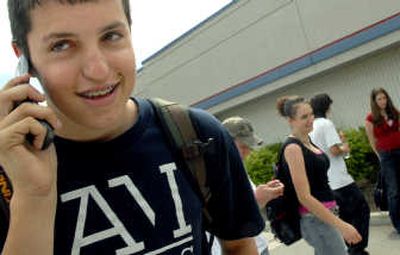Cd’A school district considers cell phone ban

Coeur d’Alene School District 271 is considering a policy change that would ban students’ use of cell phones from the moment they walk on campus until the final dismissal bell, including during lunch and breaks.
A draft of the proposed policy is making the rounds among the 17 schools in the district.
“Nothing has been decided yet,” said Harry Amend, district superintendent. “The district’s policy advisory committee is looking at our policy. It’s out in the buildings for input right now as part of that process. It will be out there for 30 days.”
Some students are very upset about the proposed change.
“I think the school and the school board is being ridiculous with how many policies they are instituting – the school is a strict environment as it is,” said Deanna Dotts, 18, a senior at Coeur d’Alene High School. “A kid using a phone in class is not distracting anyone but that student. It’s the teacher bringing attention to it that takes away time from the 29 other students in class.”
Jean Bengfort, the district’s director of technology, said the policy is being reviewed because teachers have asked for more stringent rules.
“We have also had some incidents of harassment and inappropriate pictures taken by students in our high schools,” Bengfort said. “The intent is to protect the instructional day. If students have open campus during lunch, they could still use the phones while they are off school grounds during that time.”
Current cell phone policy states that phones are not to be seen, heard or used in class unless specific permission is given by a teacher. It varies from school to school whether phones can be used on campus but outside of instructional time.
“At one middle school they ask the students to keep their phones in their lockers all day,” Bengfort said, adding that the wording of the proposed policy attempts to cover other electronic devices that allow access to the Internet.
Coeur d’Alene School District is not alone in cracking down on cell phones. In New York City, students were banned from bringing cell phones onto public school campuses three years ago. Citing safety concerns – many New York City students have long commutes on public transportation and parents want to be able to reach them – a group of citizens took the cell phone ban to the New York Supreme Court. Last month the court ruled that the New York City Department of Education can uphold the ban.
Corey Bunje Bower was a middle school teacher in the Bronx when the ban was reinstated.
“Students that use cell phones in school are incredibly disruptive and significantly inhibit learning,” Bower wrote in an e-mail. “Students were less than willing to hand over cell phones when confronted. A number of teachers refused to take them because they feared for their safety.”
Bower, who hosts the blog edpolicythoughts.com and is pursuing a Ph.D. in education policy at Vanderbilt University, adds that one of the most frustrating parts of the ban was the amount of time it took to enforce.
“A cell phone was often one of the most cherished possessions of a student, and they rarely gave it up easily,” Bower writes. “I don’t think an all-encompassing solution exists; some schools have few problems and some schools spend a great deal of time dealing with student cell phone usage.”
Locally, cell phone policies vary from district to district, and sometimes even from school to school within one district.
Central Valley School District in Spokane Valley does not have a district-wide policy.
At one of the district’s high schools – Central Valley – students can bring their cell phones to school but the phones must be turned off from the first bell to the end of the day.
“On the first warning, the phone is taken away for the day. The second warning means a referral and the third warning is Saturday school,” said Melanie Rose, spokeswoman for the district. “Beyond that, it would result in suspension.”
The rules are different at University High School, where a new policy was adopted this school year.
“They allow students to bring cell phones, but they can’t be used during class,” Rose said. “Students can use them during passing time and lunch.” On the first offense, a parent is called to come and get the phone. The second offense sends the student to Saturday school, and the third offense results in a three-day-suspension, Rose said.
“They skip the first step in the consequences, but they’ve had far fewer instances where discipline was needed,” Rose said. “I’m hearing that the teachers like the new approach because it takes out a lot of confrontation.”
Amend, the Coeur d’Alene superintendent, said that so far the district is merely collecting feedback on the proposed policy.
“The policy committee takes the input from the schools and then presents that to the school board,” he said.
Amend said he doesn’t expect the board to make a decision until July at the earliest.
Recognizing that some parents rely heavily on the ability to text-message students during the day – and that they may not like a policy that calls for cell phones to be kept off all day – the Coeur d’Alene district has posted a poll for parents on its Web site, www.cdaschools.org/.
“We’re hoping they’ll take the time to fill it out,” Bengfort said.
Dotts, the Coeur d’Alene High student, said she sees the proposed policy as just one more effort to limit students’ activities and interactions.
“We live in a technological time, many things we do involve technology. It engages students,” she said. “A rule that says you can’t use your cell phone whatsoever – I can guarantee you students are going to break that rule.”